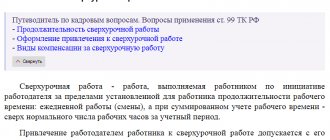Absenteeism is one of the most common types of employee dismissal. And often, from the employer’s point of view, the situation looks like absenteeism, but the motive of an employee who is absent from the workplace is not always his desire to absenteeism. Yes, of course, if an employee is absent from the workplace during the working day (during his working hours), then this can be considered a violation of labor discipline. However, one should not make hasty decisions, but first of all, correctly qualify such a violation - establish whether the employee’s absence from the workplace is absenteeism.
What is considered truancy? If an employee is absent from the workplace for more than four hours in a row without a good reason, this is considered absenteeism. For committing this disciplinary offense, the employer has the right to apply a disciplinary sanction: reprimand, reprimand or dismissal.
The Labor Code does not document valid reasons for employees’ absence from work, so the main guideline is judicial practice.
Let's figure out what reasons can be considered valid?
Absence due to illness, but no supporting documents
It is not always possible to accurately determine the day an employee fell ill, because... he can seek medical help only the next day after the onset of the illness.
In this regard, the opinion of the Supreme Court of the Russian Federation is that the document justifying the absence of an employee from work - a sick leave certificate - confirms the employee’s incapacity for work, but not the moment of its onset, i.e. hour and minute. And even if the employee is unwell, and he left work before the end of the working day (shift, duty), but he received the certificate of incapacity for work only the next day, then in this case, dismissal for absenteeism will be illegal.
But it is necessary to take into account that before receiving sick leave, the employee must receive another document confirming his illness, for example, a certificate of seeking medical help or a certificate of health. Because not only a certificate of incapacity for work, but also a certificate or a doctor’s report can be evidence of an employee’s poor health.
But if an employee was absent from the workplace for a long time and provided a certificate of dental medical care as evidence of a valid reason, then such a reason will not be valid, because in this case, it confirms only a short visit to the doctor.
When can you be fired for absenteeism?
Not every missed shift is grounds for dismissal. In order for a subordinate fired due to absenteeism to be unable to refute this order through the court, the reason must be disrespectful. To be legally dismissed, the following aspects must be met:
- the entire work shift is missed (even if its duration is only a couple of hours) or more than 4 hours of working time;
- the employee must be absent from the official workplace;
- the reason for absenteeism must be disrespectful;
- evidence of absenteeism must be recorded.
By law, absence will not be considered a violation if less than 4 hours of work time are missed. In addition, absenteeism is not counted in cases where a person does not have a specifically designated work area, or he was in another department of the company. If a person could not inform management about his absence or has a valid reason for absenteeism, then his absence should not be considered a violation of labor discipline.
Absence due to a traffic accident
An employee is involved in an accident, and as a participant in it, he needs to wait for the arrival of traffic police officers. In this case, the reason for absence is valid, and the supporting document will be a certificate of the accident, which will indicate the date and time of the incident. Dismissal in such a situation for absenteeism will be illegal.
But if in such a situation the employee is absent from work the next day, for example, on the occasion of repairing a car or transporting it from another city, without informing the employer or manager about this, then this absence can be interpreted as absenteeism.
It must be taken into account that in all situations, the employee must negotiate his absence with the employer , obtain consent from him, and best of all, if it is in the form of an order or resolution on the submitted application.
Went on vacation at my own expense without approval from my superiors
There are cases when an employer is obliged to provide an employee with leave without pay, for example, up to five days upon the death of a close relative, registration of a marriage, or the birth of a child. You need to negotiate with the employer if we are not talking about such exceptions.
Without agreement with the management of the organization, the employee does not have the right to go on vacation. In addition, upon a written application from the employee, the leave must be formalized by a personnel order indicating its duration and type, with familiarization against signature.
However, exceptions are possible to any rule. If it is impossible to comply with the procedure for taking leave at his own expense, the employee may resort to any means available to him to notify the employer of his possible absence from the workplace. If this condition is met, the courts usually side with the employee and recognize dismissal as an excessive punishment that does not correspond to the severity of the offense. But the assessment of the situation in court will depend on the circumstances and the integrity of the employee’s actions.
Went on annual leave without permission
If an employee goes on annual leave without the required registration and without approval from his superiors, then you can be prepared for the fact that this can be defined as absenteeism. The decision of the courts proving the legality in this case is based on the fact that there is no evidence of the provision of the next vacation, its period has not been agreed upon, and the employee does not belong to the category for whom vacation can be used at a convenient time.
In this case, you should pay attention to the fact that if an employee goes on leave at his main place of work, this does not mean that he can go on part-time leave without approval and registration in the appropriate manner. This is confirmed by the judicial practice of the St. Petersburg City Court, where it was recognized that it was completely legal in a similar situation for the employer to fire a part-time worker for absenteeism.
Absence due to bad weather conditions
In the event that the reason for an employee’s absence from work was bad weather conditions, and they are not related to emergency situations, then this can be regarded as absenteeism. This is because under these circumstances it is possible to get to work or inform the employer.
However, the Supreme Court of the Russian Federation, in a case dated September 12, 2019, ruled that an employee’s absence from work due to bad weather conditions may be a valid reason.
Valid reasons for absence from work - list
Home — Business organization — Personnel — Valid reasons for absence from work - list
For workers and employers, valid reasons for not showing up for work are often unknown, which leads to some mutual misunderstanding and can subsequently lead to a protracted dispute and litigation. This is due to the fact that valid reasons for failure to appear under the Labor Code are indicated extremely vaguely. However, below you can familiarize yourself with the list of valid reasons for absence from work, which will help both employees and HR officers, managers and employers to avoid problems associated with possible absenteeism.
Valid reasons for absence from work - what is it?
Failure to show up for work in itself is a disciplinary violation for which the employer has the right to hold the worker accountable.
At the same time, the degree of responsibility and its consequences for employees are extremely high - after all, the provisions of the Labor Code of the Russian Federation provide for the possibility of dismissal for a single absence without any mitigating circumstances that must be taken into account.
However, the presence of valid reasons for absence from work allows you to avoid any type of disciplinary liability.
The concept of valid reasons is not directly considered by Russian legislation as a separate term and simply provides for the presence of certain objective circumstances under which a person’s actions or inaction cannot be punished. According to this, the most often similar aspect is the principle of guilt.
Guilt occurs if a person is guilty of an offense, that is, he committed it intentionally or recklessly, understanding all the possible consequences of his actions or inaction and knowing the possibility of avoiding the negative course of events.
If there is guilt and the corresponding reason for the failure of such a person to appear at work, study, court or investigative authorities cannot be considered valid.
The reason for the dismissal was the employee's wedding
In the organization where the employee worked, the collective agreement provided for the provision of leave to employees on the occasion of marriage registration for a period of up to five calendar days, one of which was provided with payment in the amount of the tariff rate (salary), and the rest - without pay.
The employee notified his immediate supervisor in advance of his absence from work in connection with the marriage registration orally. However, upon returning to work, the employee was required to explain the reasons for his absence in writing, after which he was fired for absenteeism.
Since the employee believed that he was fired illegally, he went to the court of the city of Khabarovsk (case No. 2-1303 / 2015 dated 04/01/15). His demands were: compensation for wages for forced absence, reinstatement to his job and compensation for moral damage.
The court of first instance, refusing to satisfy the claim and siding with the employer, argued that the reason for the employee’s absence from the workplace was not valid, because he did not notify in writing of his need to take time off in connection with the marriage registration.
The appeal decision of the Judicial Collegium for Civil Cases of the Khabarovsk Regional Court was diametrically opposite (case No. 33-3783 / 2015 dated June 24, 2015). According to the collective agreement, the plaintiff cannot be denied leave for marriage.
The fact that there is no written application for time off for personal reasons is not a reason for disciplinary action . This violation does not exclude the possibility that the employee may have a valid reason for absence. Since no adverse consequences arose as a result of this, the employee had not previously been brought to disciplinary liability, the court concluded that when dismissing the employee, the reason for his absence from work and the severity of the offense were not taken into account.
Ultimately, the court declared the dismissal illegal, the employee was reinstated, and the employer was ordered to pay the employee the average wage for the period of forced absence, as well as compensate for the moral damage caused.
Reprimand as a punishment for absenteeism
In essence, a reprimand is not much different from a reprimand, but this measure is still more serious.
For example, some enterprises introduce a system of punishment for employees in which the presence of several reprimands is grounds for subsequent dismissal. A reprimand is a negative assessment of an employee’s actions by the employer, expressed by the latter in official form. Like a reprimand, a reprimand is not noted in the work record book, but can be displayed on the employee’s personal card.
The procedure for issuing a reprimand is similar to applying a reprimand and includes the following actions:
- Preparation of documents confirming the employee’s guilt (absenteeism report and memo).
- Receiving a written explanation from the employee (in case of refusal to provide an explanation, a report is also drawn up).
- The employer's decision regarding the employee's guilt. For example, if the reason for absenteeism was valid (a summons to court, an accident, illness) and the employee is able to confirm this, punishment may not be applied.
- Issuing an order to reprimand the employee. Within three working days he must be familiarized with it against his signature.
This is also important to know:
Is information about disciplinary sanctions entered into the work book: how is the entry made?
The terms for imposing a reprimand are the same as for a reprimand - six months and a month from the date of commission and discovery of the offense, respectively.
After the end of the year, the reprimand is also removed from the employee, unless during this time he has committed new disciplinary offenses.
Actions on the part of the employer
The supervisor must contact the employee to determine the reasons for absence. If this cannot be done, a registered letter is sent to a known residential address, which sets out the requirement to provide explanations regarding the reasons for absence from work.
The citizen is given a two-day period to respond to the employer’s administration, during which he is obliged to submit an explanatory note.
If the letter is returned with a note that the citizen is absent from the specified address, the employer must contact neighbors or the police station in order to find out the whereabouts of the employee.
This measure is necessary, because if an employee is detected and compelling reasons are provided for the person’s absence from the workplace, the employee is subject to full reinstatement through the court.
Thus, a mandatory condition for dismissal under the article for absenteeism will be the presentation of conclusive evidence of the very fact of absenteeism without a good reason. The following documents will help document the fact that an employee is absent from the workplace:
- Entry in the report card.
- A document drawn up establishing the fact of the employee’s absence.
- A notice sent to the employee's home address asking him to return to work.
By following this step-by-step procedure, the administration will be able to fire a truant without any undesirable consequences in the future:
- Obtaining grounds for dismissal - drawing up an absence certificate. The act is drawn up in free form, but must necessarily reflect information about the specific day, time, and duration of absence.
- Certification of the act by witnesses.
- If there are several absences, a report is signed for each day of absence.
- Explanatory Requirement. If an employee appears at the workplace, the administration requires an explanation for the unapproved absence
- Within two days after receiving the request to provide an explanatory note, the employee prepares a note outlining the reasons for his absence.
- If the note is not provided within the required period, this is recorded in the presence of three witnesses in the relevant act.
- The manager prepares a memo addressed to the director of the organization with a note from the employee attached.
- If the reason for non-appearance is considered disrespectful, an order is issued in the strictly established T-8 form.
This order serves as the basis for further dismissal procedures. Since any deviation from the standard established by law will allow it to be challenged in court . When drawing up and issuing an order, follow the following instructions:
- The date of termination of the employment agreement must be reflected.
- The reason for dismissal is indicated.
- The order mentions the documents that served as confirmation of absenteeism.
Three days are allotted for the employee to familiarize himself with the order, followed by registration of the order in a special personnel register. Changes are made to the work time sheet: the NN mark changes to PR, which records the fact of absenteeism.
It is very important to fire a negligent employee correctly by making correct entries in the employment record:
- in the first column indicate the entry number in order;
- in the second - the date of the event;
- the third column is filled in with information about dismissal indicating Article 81 of the Labor Code of the Russian Federation;
- in the fourth indicate the number and date of the order.
After completion of the registration, the employee is given the latest documents, payroll documents, and if the employee does not show up for work, if it is impossible to hand over the documents, they are sent to the address of the dismissed person by registered mail.
This is also important to know:
What is disciplinary action, in what cases is it applied?
Before giving the work record to the dismissed person, the records are duplicated into a personal card in the T-2 form and certified by the employee’s signature. Each entry from the labor record must be reflected in the card and certified by the signature of the dismissed employee .
According to Article 81 of the Labor Code (clause a, clause 6.p.1), as a basis for dismissal, an entry is made in the labor report about dismissal “in connection with a single gross violation of labor duties.” To avoid problems with the Social Insurance Fund in the future, a copy is made of the work book and transferred to the archive.










